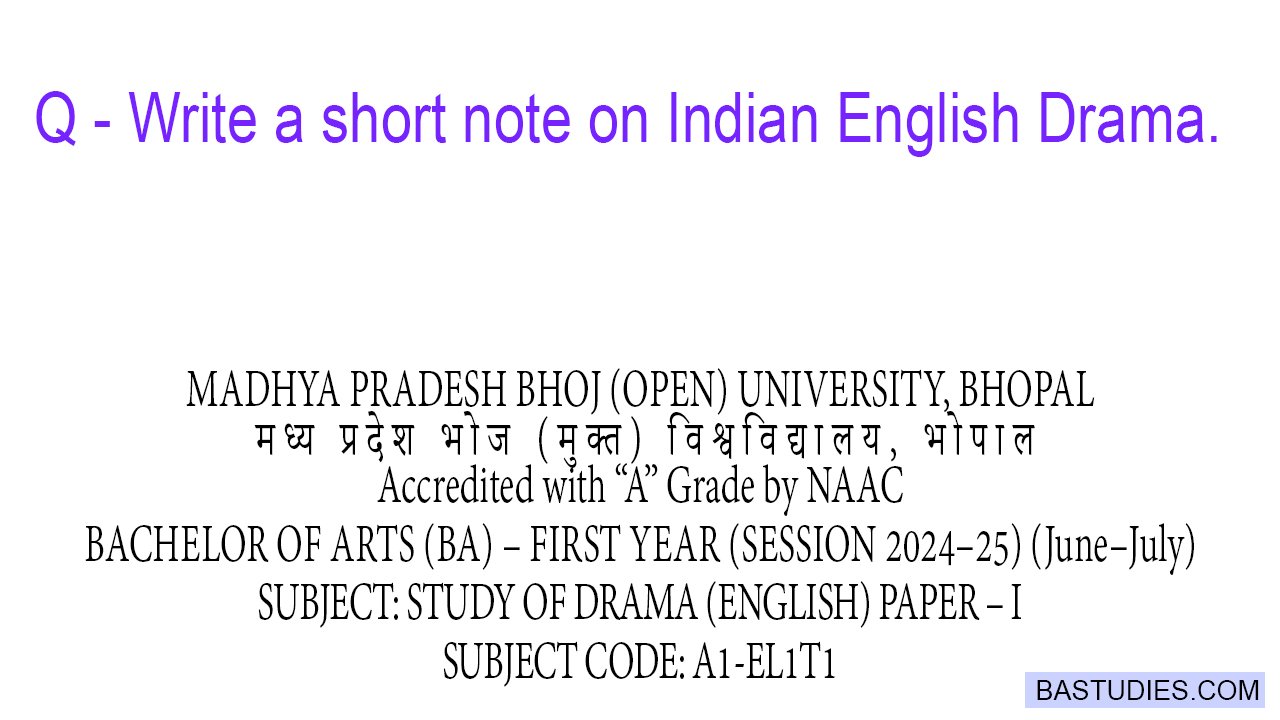Write a short note on Indian English Drama
B.A. First Year – Study of Drama (English), Paper – I (Subject Code: A1-EL1T1)
Q – Write a short note on Indian English Drama
ANSWER –
Short Note on Indian English Drama
Introduction
Indian English Drama refers to the body of plays written by Indian playwrights in the English language. It is a significant branch of Indian English literature and plays a vital role in portraying Indian society, culture, traditions, and political realities. While Indian drama in regional languages has a long and ancient tradition (rooted in Sanskrit, Tamil, etc.), drama written in English is a more modern development, emerging in the 19th century during British colonial rule.
Indian English Drama combines Western theatrical forms with Indian themes, reflecting the rich diversity, complexity, and contradictions of Indian life. It is a powerful medium for expressing individual and collective struggles, identity issues, gender concerns, and postcolonial challenges.
Historical Background and Evolution
-
Colonial Influence and Early Beginnings:
Indian English drama began during the British rule in India. English education introduced Indians to Western forms of drama, especially the works of Shakespeare and other Elizabethan and Victorian playwrights. Inspired by these, Indian writers began to experiment with drama in English.The earliest plays in English were written mostly for reading rather than performance. They followed Western formats closely and were often imitative in nature.
-
Early Pioneers:
-
Michael Madhusudan Dutt was one of the first Indian playwrights to write in English. His blank verse tragedy Is This Called Civilization? (1871) was among the earliest attempts.
-
K.M. Panikkar, Sri Aurobindo, and Harindranath Chattopadhyaya contributed to early Indian English drama, often dealing with philosophical or mythological themes.
-
-
Post-Independence Growth:
After 1947, Indian English drama witnessed more originality and confidence. Playwrights began to deal with social issues, national identity, urban life, and human psychology. English theatre groups emerged in cities like Delhi, Mumbai, Kolkata, and Bengaluru, helping to stage and popularize Indian English plays.
Characteristics of Indian English Drama
-
Fusion of East and West:
Indian English drama blends Western dramatic techniques with Indian settings, characters, and conflicts. It uses Indian mythology, history, and folklore alongside modern themes. -
Social Realism:
Many Indian English plays reflect social realities like caste discrimination, communalism, poverty, political corruption, gender inequality, and family conflicts. -
Postcolonial Themes:
Several plays explore the postcolonial identity crisis, the influence of Western culture, and the tension between tradition and modernity. -
Myth and History:
Indian English dramatists often reinterpret mythological stories and historical events to comment on contemporary issues. -
Language and Dialogue:
The language used in Indian English drama is often simple and functional, with occasional use of Indian idioms, code-switching, and regional phrases to maintain cultural authenticity. -
Urban vs. Rural Divide:
Many plays portray the conflict between urban modernity and rural tradition, highlighting the changing face of Indian society.
Major Indian English Dramatists and Their Works
-
Girish Karnad (1938–2019):
One of the most important voices in Indian theatre, Karnad wrote plays in Kannada and English. His plays combine mythology with modern issues.
Famous Works:-
Tughlaq – A political allegory based on the 14th-century Sultan of Delhi.
-
Hayavadana – Explores identity and incompleteness using myth and folklore.
-
Nagamandala – A feminist play blending folklore and fantasy.
-
-
Vijay Tendulkar (1928–2008):
Although Tendulkar primarily wrote in Marathi, his plays were widely translated into English and performed globally. His plays are known for their psychological depth and social commentary.
Famous Works:-
Silence! The Court is in Session – A powerful critique of hypocrisy and patriarchy.
-
Ghashiram Kotwal – A political satire with traditional Marathi folk forms.
-
-
Mahesh Dattani (b. 1958):
The first Indian playwright in English to win the Sahitya Akademi Award. Dattani’s works focus on urban middle-class life and marginalized identities, including LGBTQ+ issues.
Famous Works:-
Final Solutions – Deals with communal tensions in India.
-
Dance Like a Man – Explores gender roles and generational conflict.
-
Bravely Fought the Queen – Highlights issues of patriarchy and hidden sexualities.
-
-
Manjula Padmanabhan:
Known for futuristic and dystopian drama, her play Harvest won the Onassis Prize. It deals with organ selling and Western exploitation of the Third World. -
Badal Sircar, Dina Mehta, Poile Sengupta, and Asif Currimbhoy are other notable contributors to Indian English drama.
Themes in Indian English Drama
-
Conflict between tradition and modernity
-
Gender and patriarchy
-
Political and social oppression
-
Religious intolerance and communalism
-
Search for identity
-
Globalization and Western influence
-
Class and caste inequality
-
LGBTQ+ rights and mental health awareness
Challenges Faced by Indian English Drama
-
Limited Audience Reach: English-language plays often appeal to a niche urban audience, limiting their popularity in rural and regional areas.
-
Competition with Regional Theatres: Indian drama in languages like Hindi, Marathi, Bengali, and Kannada often receives more attention and funding.
-
Performance Constraints: Staging English plays in India can be costly and may lack infrastructure support compared to mainstream cinema or television.
Conclusion – Write a short note on Indian English Drama
Indian English Drama is a dynamic and evolving form of literature that reflects the diversity and complexity of Indian society. From mythological reinterpretations to hard-hitting social critiques, it has emerged as a strong voice in modern theatre. Writers like Girish Karnad and Mahesh Dattani have given Indian English drama international recognition, proving that English, though a colonial language, can be a powerful medium to express Indian realities. As global interest in Indian writing continues to grow, Indian English drama is poised to play a significant role in the world stage.
READ ALSO – Write a short note on Restoration drama
READ ALSO – Write a short note on Elizabethan Drama
READ ALSO – Give a brief character sketch of Mephistopheles in Dr Faustus
MORE Q&A – STUDY OF DRAMA

2 thoughts on “Write a short note on Indian English Drama”